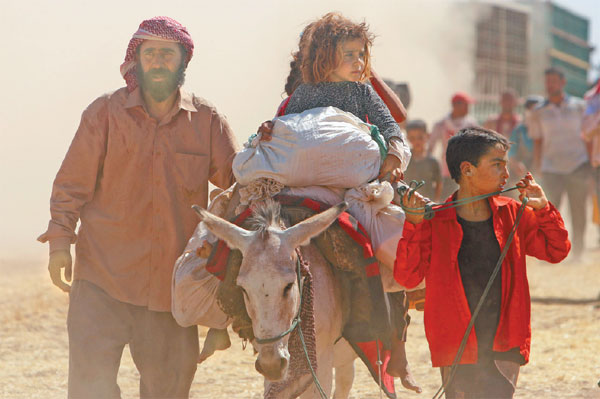130 more US troops in Iraq to 'assess' situation




Australia will not rule out sending combat forces to protect civilians
Another 130 US troops arrived in Iraq on Tuesday on what the Pentagon described as a temporary mission to assess the scope of the humanitarian crisis facing thousands of displaced Iraqi civilians trapped on Sinjar Mountain and evaluate options for getting them out.
US Defense Secretary Chuck Hagel announced the deployment in remarks to Marines at a southern California base on the final stop of a weeklong, around-the-world trip that also took him to India, Germany and Australia.
|
Displaced people from the minority Yazidi sect, fleeing violence from forces loyal to the Islamic State in Sinjar town, walk toward the Syrian border as others ride on a donkey on the outskirts of Sinjar mountain, near the Syrian border town of Elierbeh of Al-Hasakah Governorate on Monday. Rodi Said / Reuters |
"This is not a combat-boots-on-the-ground kind of operation," Hagel said. "We're not going back into Iraq in any of the same combat mission dimensions that we once were in in Iraq," he added, referring to the eight-year war that cost more than 4,400 US lives and soured the US public on military involvement in Iraq.
Another defense official, speaking on condition of anonymity to provide additional details on the sensitive mission, said the extra troops were Marines and special operations forces whose mission was to assess the situation in the Sinjar area and to develop additional humanitarian assistance options beyond current US efforts there. Still another official said the mission for the 130 troops could last less than a week.
That official also said that while the troops were not being sent in to execute some type of rescue mission of the Yazidis on the mountain, they would assess the feasibility of a rescue or what one might look like. The also would assist in the ongoing effort to evaluate the use of airstrikes as part of the mission to protect the Yazidis from attacks by Islamic State militants.
Hagel referred to the 130 as "assessors".
The move shows the Obama administration is weighing the effect and implications of several days of targeted airstrikes on the Islamic State fighters and how that has affected US-backed Kurdish forces opposing them in northern Iraq.
US President Barack Obama has said repeatedly he will not send ground combat forces back into Iraq.
Immediate dilemma
One immediate dilemma was the fate of thousands of displaced Yazidis in the Sinjar area who have been provided with food and water delivered by US cargo planes in recent days. Washington also was considering how to increase its military assistance to the Kurds, whose militia is outgunned by the militants.
Meanwhile, Australian Prime Minister Tony Abbott has held open the possibility of sending a combat force to Iraq in addition to military transport aircraft to airlift humanitarian aid to refugees in Iraq, although his defense minister played down the prospect.
Abbott told reporters in London after meeting with British officials on the Iraq crisis on Tuesday that his government would not rule out taking military action in Iraq.
"The disposition of the Australian government is to provide what assistance we reasonably can to protect people who are at risk not just from the elements - from starvation, from dehydration, from exposure on Mount Sinjar - but also people who are at risk from ISIL forces," Abbott told reporters, referring to the al-Qaida splinter group leading Sunni militants in Iraq, Islamic State of Iraq and the Levant, now known as Islamic State.
"Australia should do what it can ... to protect people from potential genocide," he said.















